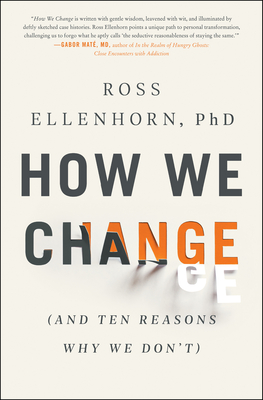How We Change: (And Ten Reasons Why We Don't)

How We Change: (And Ten Reasons Why We Don't)
The Coronavirus pandemic has revealed a very big secret we've been keeping from ourselves and each other: We can be remarkably agile in the face of change. How is it that we are able to so radically and rapidly change our daily behavior in order to follow the social distancing and stay-at-home policies during the pandemic, and yet--pandemic or not--we typically find it difficult, if not impossible, to reach smaller personal goals like dieting, getting organized or changing destructive habits? The pandemic is life-threatening, so it ignites our survival instincts, activating that part of our brains charged with speedily and efficiently getting us to safety. But cholesterol, alcohol, and physical passivity are all life-threatening, and many of us humans have done a lousy job changing in regard to these issues, even when we have reliable information that they are killing us. Why do we struggle to change what would so obviously help ourselves individually? Ross Ellenhorn's book, How we Change (and the Ten Reasons Why We Don't) gives a fascinating answer. A clinician and thought leader in the mental health and addiction fields, he suggests that we're often looking in the wrong direction when we try to decipher the factors that support human change. He suggests that it's much more fruitful to look at why we don't change, than figure out why we do. By looking at the reasons we don't change, we give ourselves the best chance of actually changing in meaningful ways. Ellenhorn explains how we are wired to double down on the familiar because of what he calls the "Fear of Hope" - the act of protecting ourselves from further disappointment--and identifies the "10 Reasons Not to Change" to help us see why we behave the way we do when we are faced with the challenge of hope. Among them are: - To change means raising your expectations and thus risking that you'll disappoint yourself.- Once you change, you are more accountable to make other changes than if you stayed the same- When you change, your future become much less predictable.- Change means destroying psychological monuments you've built to commemorate past injuries- Every time you change, you raise the possibility of losing or disrupting your relationship with certain peopleBy addressing this little known reality of fear of hope, and how it influences the 10 Reasons Not to Change, Ellenhorn actually gives us hope, helping us to work toward the change we seek. Ellenhorn speaks to the core of our insecuritie
PRP: 143.93 Lei
Acesta este Prețul Recomandat de Producător. Prețul de vânzare al produsului este afișat mai jos.
115.14Lei
115.14Lei
143.93 LeiLivrare in 2-4 saptamani
Descrierea produsului
The Coronavirus pandemic has revealed a very big secret we've been keeping from ourselves and each other: We can be remarkably agile in the face of change. How is it that we are able to so radically and rapidly change our daily behavior in order to follow the social distancing and stay-at-home policies during the pandemic, and yet--pandemic or not--we typically find it difficult, if not impossible, to reach smaller personal goals like dieting, getting organized or changing destructive habits? The pandemic is life-threatening, so it ignites our survival instincts, activating that part of our brains charged with speedily and efficiently getting us to safety. But cholesterol, alcohol, and physical passivity are all life-threatening, and many of us humans have done a lousy job changing in regard to these issues, even when we have reliable information that they are killing us. Why do we struggle to change what would so obviously help ourselves individually? Ross Ellenhorn's book, How we Change (and the Ten Reasons Why We Don't) gives a fascinating answer. A clinician and thought leader in the mental health and addiction fields, he suggests that we're often looking in the wrong direction when we try to decipher the factors that support human change. He suggests that it's much more fruitful to look at why we don't change, than figure out why we do. By looking at the reasons we don't change, we give ourselves the best chance of actually changing in meaningful ways. Ellenhorn explains how we are wired to double down on the familiar because of what he calls the "Fear of Hope" - the act of protecting ourselves from further disappointment--and identifies the "10 Reasons Not to Change" to help us see why we behave the way we do when we are faced with the challenge of hope. Among them are: - To change means raising your expectations and thus risking that you'll disappoint yourself.- Once you change, you are more accountable to make other changes than if you stayed the same- When you change, your future become much less predictable.- Change means destroying psychological monuments you've built to commemorate past injuries- Every time you change, you raise the possibility of losing or disrupting your relationship with certain peopleBy addressing this little known reality of fear of hope, and how it influences the 10 Reasons Not to Change, Ellenhorn actually gives us hope, helping us to work toward the change we seek. Ellenhorn speaks to the core of our insecuritie
Detaliile produsului










